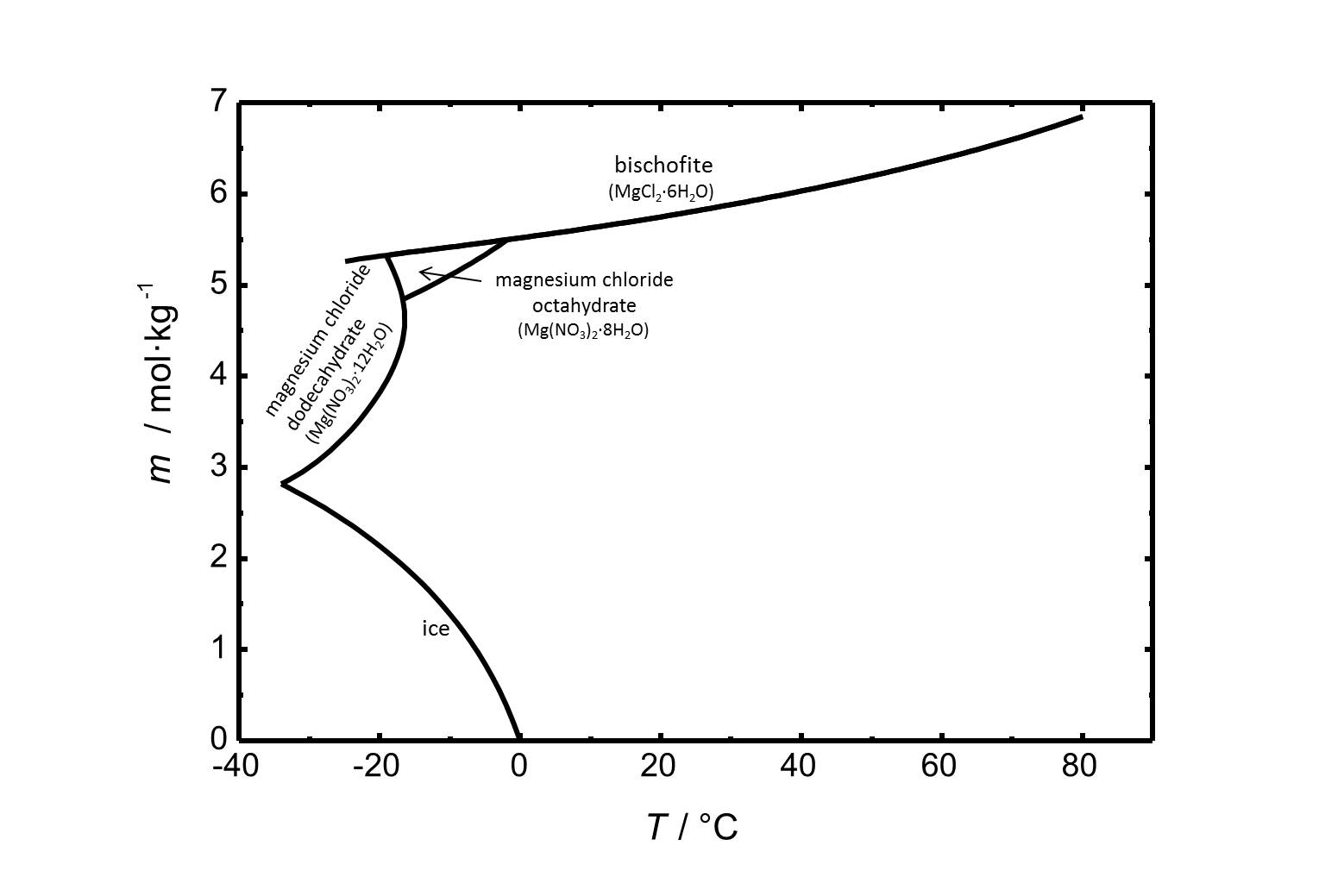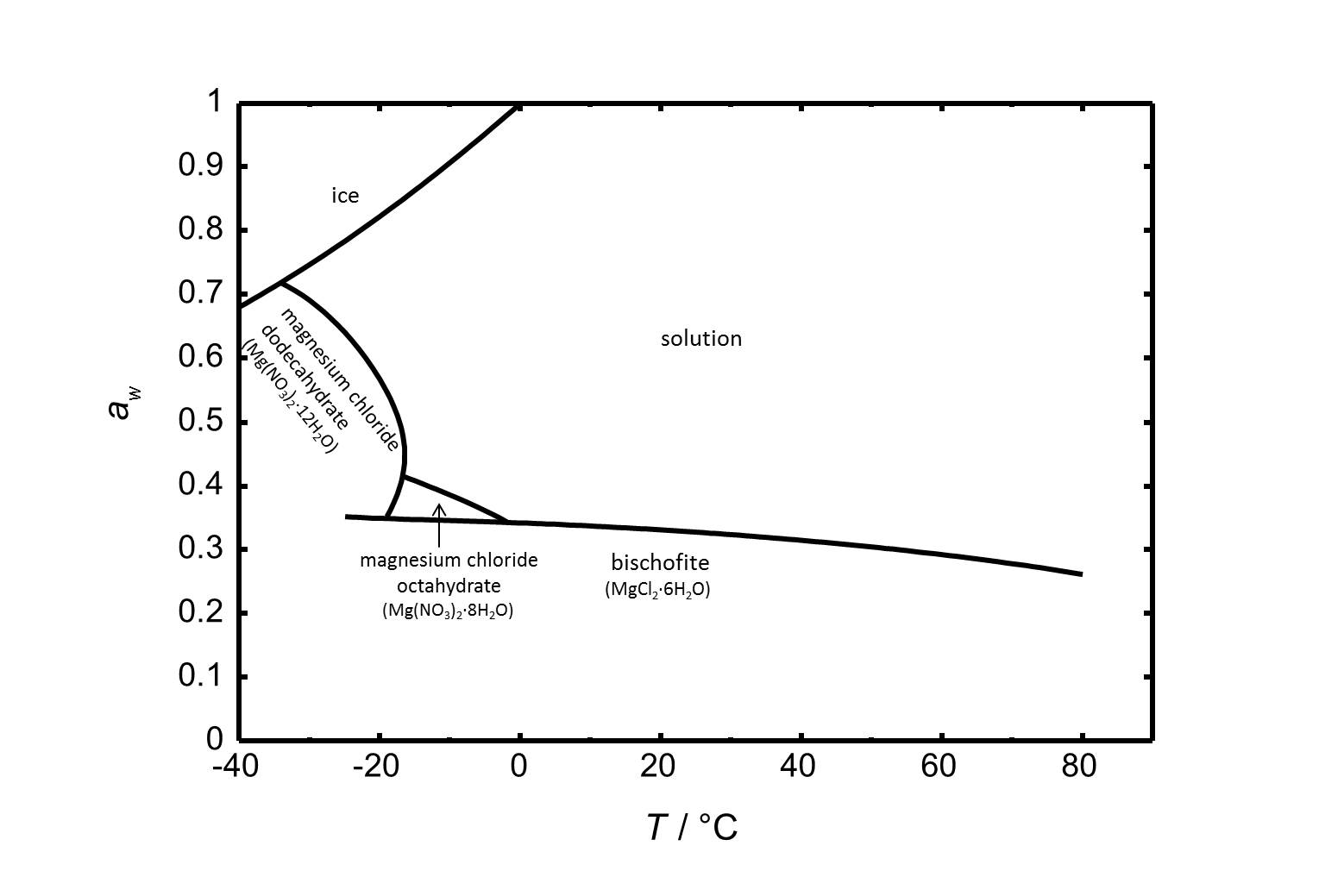Bischofite: Difference between revisions
Jump to navigation
Jump to search
No edit summary |
|||
| Line 12: | Line 12: | ||
|Crystal_Structure = | |Crystal_Structure = | ||
|Deliqueszenzhumidity =33.1% | |Deliqueszenzhumidity =33.1% | ||
|Solubility = | |Solubility =5.75 mol/kg | ||
|Density =1.57 g/cm<sup>3</sup> | |Density =1.57 g/cm<sup>3</sup> | ||
|MolVolume =129.6 cm<sup>3</sup>/mol | |MolVolume =129.6 cm<sup>3</sup>/mol | ||
| Line 28: | Line 28: | ||
|chemBehavior = | |chemBehavior = | ||
|Comments =decomposes at 116-118°C<br>hygroscopic and deliquescent | |Comments =decomposes at 116-118°C<br>hygroscopic and deliquescent | ||
|Literature = <bib id="Broul.etal:1981"/> <bib id="Dana:1951"/> | |Literature = <bib id="Broul.etal:1981"/> <bib id="Dana:1951"/> <bib id="Steiger.etal:2011a"/> | ||
}} | }} | ||
==Solubility== | |||
Bischofite has got a high solubility in water (5.75 mol/kg at 20 °C). The solubility of bischofite and other phases of the system MgCl<sub>2</sub>-H<sub>2</sub>O is shown in Fig. 1. <br> | |||
[[Image:MgCl2 S.jpg|thumb|left|500px|Figure 1: Solubility of magnesium chloride in water. The molality ''m'' [n(MgCl<sub>2</sub>)•kg(H<sub>2</sub>O)<sup>-1</sup>] is plotted versus the temperature.]] | |||
<br clear=all> | |||
==Hygroscopicity== | ==Hygroscopicity== | ||
Figure 2 includes the phase diagram of the system MgCl<sub>2</sub>-H<sub>2</sub>O. Next to the hexahydrate bischofite there are two more stable phases within the regarded temperature range. The octa- and the dodecahydrate are relevant at lower temperatures. <br> | |||
[[Image:D MgCl2 e.jpg|thumb|right|500px|Figure 2: Phase diagram of the system MgCl<sub>2</sub>-H<sub>2</sub>O.The water activity ''a<sub>w</sub> is plotted versus the temperature.]] | |||
<br clear="all"> | |||
<br clear=all> | <br clear=all> | ||
Revision as of 12:07, 21 December 2015
back to Chloride
| Bischofite[1][2] | |
| Mineralogical name | Bischofite |
| Chemical name | Magnesium chloride hexahydrate |
| Trivial name | |
| Chemical formula | MgCl2•6H2O |
| Other forms | |
| Crystal system | monoclinic |
| Crystal structure | |
| Deliquescence humidity 20°C | 33.1% |
| Solubility (g/l) at 20°C | 5.75 mol/kg |
| Density (g/cm³) | 1.57 g/cm3 |
| Molar volume | 129.6 cm3/mol |
| Molar weight | 203.30 g/mol |
| Transparency | transparent to translucent |
| Cleavage | none |
| Crystal habit | |
| Twinning | |
| Phase transition | |
| Chemical behavior | |
| Comments | decomposes at 116-118°C hygroscopic and deliquescent |
| Crystal Optics | |
| Refractive Indices | nx =1.495 ny = 1.509 nz = 1.528 |
| Birefringence | Δ = 0.003 |
| Optical Orientation | positive |
| Pleochroism | |
| Dispersion | 79° |
| Used Literature | |
| [Broul.etal:1981]Title: Solubility in organic two component systems Author: Broul M., Nyvlt J.; Soehnel O.  [Dana:1951]Title: Dana's System of Mineralogy [Dana:1951]Title: Dana's System of MineralogyAuthor: Dana J.D.  [Steiger.etal:2011a]Title: Decomposition reactions of magnesium sulfate hydrates and phase equilibria in the MgSO4-H2O and Na+-Mg2+-Cl--SO42--H2O systems with implications for Mars [Steiger.etal:2011a]Title: Decomposition reactions of magnesium sulfate hydrates and phase equilibria in the MgSO4-H2O and Na+-Mg2+-Cl--SO42--H2O systems with implications for MarsAuthor: Steiger, Michael; Linnow, Kirsten; Ehrhardt, Dorothee; Rohde, Mandy 
| |
Solubility[edit]
Bischofite has got a high solubility in water (5.75 mol/kg at 20 °C). The solubility of bischofite and other phases of the system MgCl2-H2O is shown in Fig. 1.
Hygroscopicity[edit]
Figure 2 includes the phase diagram of the system MgCl2-H2O. Next to the hexahydrate bischofite there are two more stable phases within the regarded temperature range. The octa- and the dodecahydrate are relevant at lower temperatures.
| 0°C | 10°C | 20°C | 30°C | 40°C | 50°C |
| 34.1%r.h. | 33.7%r.h. | 33.1%r.h. | 32.4%r.h. | 31.5%r.h. | 30.5%r.h. |
Weblinks[edit]
- ↑ http://webmineral.com/data/Bischofite.shtml viewed on 29/07/2010
- ↑ http://www.mindat.org/min-681.html viewed on 29/07/2010
Literature[edit]
| [Broul.etal:1981] | Elsevier (eds.) Broul M., Nyvlt J.; Soehnel O. (1981): Solubility in organic two component systems, Elsevier |  |
| [Dana:1951] | Dana E.S. (eds.) Dana J.D. (1951): Dana's System of Mineralogy, 7, Wiley & Sons |  |
| [Steiger.etal:2011a] | Steiger, Michael; Linnow, Kirsten; Ehrhardt, Dorothee; Rohde, Mandy (2011): Decomposition reactions of magnesium sulfate hydrates and phase equilibria in the MgSO4-H2O and Na+-Mg2+-Cl--SO42--H2O systems with implications for Mars. In: Geochimica et Cosmochimica Act, 75 (12), 3600-3626, 10.1016/j.gca.2011.03.038, |  |
| [Steiger.etal:2014] | Steiger, Michael; Charola A. Elena; Sterflinger, Katja (2014): Weathering and Deterioration. In: Siegesmund S.; Snethlage R. (eds.): Stone in Architecture, Springer Verlag Berlin Heidelberg, 223-316, 10.1007/978-3-642-45155-3_4. |  |

